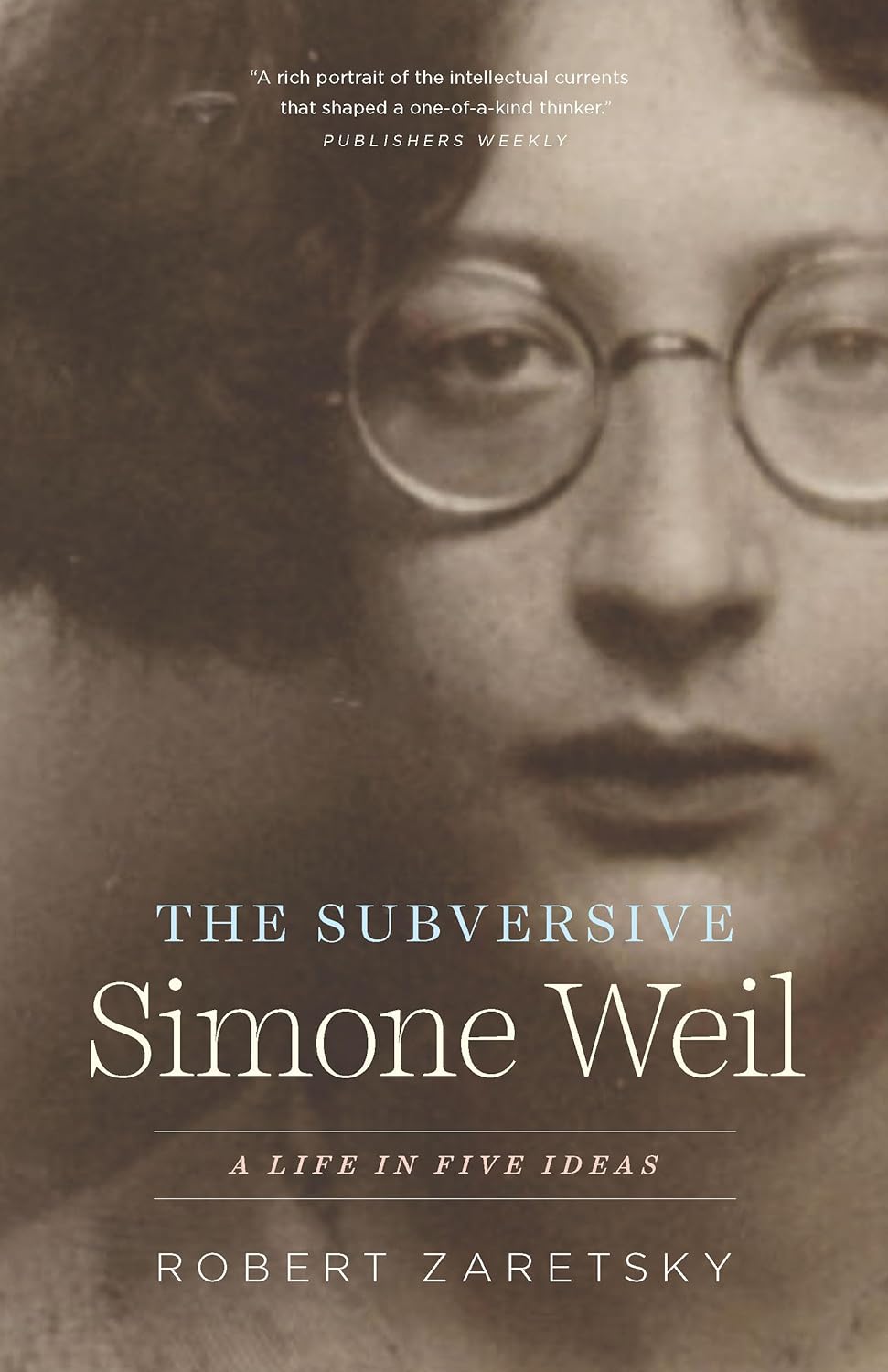In this episode of Biographers in Conversation, the intellectual historian Dr Robert Zaretsky chats with Dr Gabriella Kelly-Davies about his choices while writing The Subversive Simone Weil: A Life in Five Ideas. Known as the ‘patron saint of all outsiders’, Simone Weil was one of the twentieth century’s most remarkable thinkers, a philosopher who truly lived by her political and ethical ideals.
The Subversive Simone Weil
The Subversive Simone Weil is a hybrid of biography and philosophy. Robert Zaretsky asserts that Simone Weil’s philosophy is best read against the background of her biography, because her biography is inseparable from her philosophical ethos. While Robert examines several episodes in Simone’s life, he doesn’t present the arc of her life chronologically or exhaustively. Instead, he explores her philosophies and search for truth through the prism of her life.
Giving a Life to Simone’s French Philosophies in an English Translation
The Subversive Simone Weil is structured around five chapters that present Simone’s core philosophies. Each chapter integrates Simone’s personal eccentricities with analyses and critiques of her thought.
For Simone, philosophy couldn’t be merely an academic discipline. Instead, it must be a way of life. She demanded that one live by acting according to strict moral principles. Simone believed she must accept the consequences of the truth she told, and live out her principles, often to her detriment and ultimately, premature death.

Simone Weil
In a short life framed by the two world wars, Simone Weil taught philosophy to Lycée students, organised union workers and fought alongside anarchists during the Spanish Civil War. She also laboured alongside workers on factory assembly lines, joined the Free French movement in London and died in despair because she wasn’t allowed to travel to France to help the Resistance.
Though Simone Weil published little during her life, after her death, thanks largely to the efforts of Albert Camus, hundreds of pages of her manuscripts were published to critical and popular acclaim. Since 1995, more than 5,000 scholarly works have been published about her, including several biographies.

Simone Weil
While many authors have written about Simone’s religious thought, Robert Zaretsky also explores her insights into politics and ethics. He shows us a new side of Simone Weil that balances her contradictions: the rigorous rationalist who also had her own brand of Catholic mysticism; the revolutionary with a soft spot for anarchism yet who believed in the hierarchy of labour; and the humanitarian who emphasised human needs and obligations over human rights.
Simone Weil’s Contradictions
Reflecting on the relationship between thought and action in Simone’s life, The Subversive Simone Weil honours the complexity of her thought, speaks to why it matters and why it continues to fascinate readers today.

Simone Weil
Robert Zaretsky offers readers a compelling and humane portrayal of Simone, balancing her extreme philosophies and choices with clarity and grace. The Subversive Simone Weil serves as a testament to Simone’s enduring legacy and the profound impact of her ideas on contemporary thought.
Praise for The Subversive Simone Weil: A Life in Five Ideas
Robert Zaretsky’s The Subversive Simone Weil: A Life in Five Ideas elegantly captures its subject’s brief life and expansive thought in a schema that pays eloquent tribute to the continuing relevance of both.
Rachel Hadas | Times Literary Supplement, Books of the Year 2021
[Zaretsky] is an admirably fluent and humble guide, who elucidates her writings; yet he doesn’t shy away from confessing that, at times, he’s baffled by her. Often she will make a claim that “compels as powerfully as it repels”, he notes. He grapples with Weil as she demands to be grappled with, not as a purely abstract thinker but as a singular voice demanding that we think and act with integrity.
Times Literary Supplement
After an introduction that contextualizes Weil’s short, unusual life, Zaretsky dedicates chapters—each written in an elegant, accessible prose—to five essential columns that brace her philosophy: affliction, attention, resistance, rootedness, and goodness.
Los Angeles Review of Books
This biography of an exceptional 20th-century thinker traces her inspirational experiences and philosophy. Zaretsky unveils Weil’s depth and seeming contradictions (rationalism and mysticism, revolution and belief) to explain her lasting appeal to readers.
The Bookseller
Zaretsky guides us through Weil’s complexities with impressive lucidity, keeping it lively and accessible, which is no small feat.
The Baffler
In clear, accessible prose, Zaretsky gives some coherence to Weil’s largely fragmentary oeuvre. What emerges is a portrait of a politically unclassifiable thinker who in her life and writings committed herself to be open to the unbearable reality around her.
Prospect
This memorable survey delivers a rich portrait of the intellectual currents that shaped a one-of-a-kind thinker. Those curious about Weil’s work will find this to be a welcome place to start.
Publishers Weekly
It is hard to see how a figure so marvelously intemperate could ever be bridled to the satisfaction of the Anglo-American mainstream. Still, the intellectual historian Robert Zaretsky has made an impressive attempt to win over skeptics in his new book, The Subversive Simone Weil: A Life in Five Ideas. Somewhere between biography and philosophical overview, Zaretsky’s study sorts Weil’s views into five central categories. Each of the corresponding chapters integrates discussion of her personal eccentricities with analyses, rehabilitations, and critiques of her thought. . . . Weil may be subversive, but The Subversive Simone Weil is balanced and accessible.
Hedgehog Review
Simone Weil was merciless (not least on herself), sometimes alarming, always compelling, and unavoidably significant. This is a beautifully sharp and thoughtful account of her life and work—a fascinating read.
Sarah Bakewell, author of At the Existentialist Café: Freedom, Being, and Apricot Cocktails with Jean-Paul Sartre, Simone de Beauvoir, Albert Camus, Martin Heidegger, Maurice Merleau-Ponty and Others
Zaretsky’s work is unfailingly eloquent, fascinating, and relevant. In treating both her life and her writings, The Subversive Simone Weil displays a subject who, by going too far toward goodness, reminds so many of us that we have not gone far enough. In Zaretsky’s hands, her courage stands as a complicated but necessary lesson for us all.
Todd May, author of A Decent Life: Morality for the Rest of Us
Reading Zaretsky’s absorbing and tender intellectual portrait of Simone Weil, I was reminded on every page of her astonishing relevance to our own times. With her demanding vision of the life well lived, in her extreme judgments and through her punishing empathy, Weil emerges here as a figurehead for the intellectual and ethical challenges of the current moment. As he has done so beautifully in his books on Camus, Zaretsky has opened Weil’s life and work to our understanding. For readers familiar with Weil’s, The Subversive Simone Weil is a valuable synthesis; for those coming to her for the first time, an inspiring primer.
Alice Kaplan, author of Looking for “The Stranger”: Albert Camus and the Life of a Literary Classic
An unconventional introduction to the thought of Simone Weil: it is not a biography nor is it a straightforward exposition of her writings. Zaretsky is clearly enchanted by Weil’s philosophy and presents her ideas with clarity. But he also sees her faults, her impracticalities, and her contradictions. . . .Readers will come away with a basic understanding of Weil’s world view but not without wrestling with her ideas and their complications. Recommended.
Choice
Role of a Biographer

Photographer: Ethan White.
About Robert Zaretsky
Robert Zaretsky is a renowned scholar in the field of modern European intellectual and cultural history. During his academic career, he taught courses in modern French and European history, ranging from perspectives on the Enlightenment to everyday life in Occupied Europe, and from the modern experience of exile to the history of history writing.
Robert is the author of Boswell’s Enlightenment; A Life Worth Living: Albert Camus and the Quest for Meaning; and Catherine & Diderot: The Empress, the Philosopher, and the Fate of the Enlightenment, among many other books.
A frequent contributor to the New York Times, the Washington Post, Foreign Affairs, the Times Literary Supplement, the Los Angeles Review of Books, and the Chronicle of Higher Education, he lives in Houston with his wife, children and assorted pets.
Interviews with Robert Zaretsky
American Library Paris: Interview with Robert Zaretsky: https://www.youtube.com/watch?v=ukIdOItao6w
The Subversive Simone Weil: Robert Zaretsky in conversation with Lottie Moore, ‘The Philosopher’: https://www.youtube.com/watch?v=YjnHg7ExN98
In conversation with Robert Zaretsky: Irresistible Simone Weil, Kasia Krzyżanowska, RevDem Podcast
Simone Weil’s radical philosophy of love and attention, The Gray Area with Sean Illing
Excerpt from the Introduction to The Subversive Simone Weil
It has become a ritual among Weil biographers to sum up her life with a series of contradictions. An anarchist who espoused conservative ideals, a pacifist who fought in the Spanish Civil War, a saint who refused baptism, a mystic who was a labour militant, a French Jew who was buried in the Catholic section of an English cemetery, a teacher who dismissed the importance of solving a problem, the most wilful of individuals who advocated the extinction of the self: here are but a few of the paradoxes Weil embodied. It helps to see these instances less as inconsistencies in Weil’s work and life— though, at times, they are precisely this—than as invitations to reflect on both one and the other. In her notebooks, she wrote that the “proper method of philosophy consists in clearly conceiving the insoluble problems in all their insolubility and then in simply contemplating them, fixedly and tirelessly, year after year, without any hope, patiently waiting.”
By this measure, Weil concluded, “there are few philosophers. And one can hardly even say a few.” Not surprisingly, Weil held an exacting view of the philosopher’s mandate. It is, she declared, “exclusively an affair of action and practice.” This was the reason, she thought, why it was so difficult to write about philosophy—it was, she suggested, like writing a “treatise on tennis or running”—but it is also the reason why contradictions score Weil’s life. They reveal the inevitable tensions in a life that placed so great a premium on aligning ideals and practice, an effort that had to fall short sooner or later. But Weil’s effort to straddle these contradictions, as well as the nature of the ideals that inspired her action, demand our attention. She was, in fact, no less singular in her insistence on accepting the consequences of a given truth than she was in her insistence on matching her ideals with her acts. As her students often heard her declare, Weil could not stand compromise, whether it was with her own self or with others. In turn, we cannot stand for very long in her severe company without feeling deeply discomforted. This is as it should be. To a degree rare in the modern age—or, indeed, any age—Simone Weil fully inhabited her philosophy.




